Copyright 2013 by Dean R. Owen
All rights reserved. No part of this book may be reproduced in any manner without the express written consent of the publisher, except in the case of brief excerpts in critical reviews or articles. All inquiries should be addressed to Skyhorse Publishing, 307 West 36th Street, 11th Floor, New York, NY 10018.
Skyhorse Publishing books may be purchased in bulk at special discounts for sales promotion, corporate gifts, fund-raising, or educational purposes. Special editions can also be created to specifications. For details, contact the Special Sales Department, Skyhorse Publishing, 307 West 36th Street, 11th Floor, New York, NY 10018 or .
Skyhorse and Skyhorse Publishing are registered trademarks of Skyhorse Publishing, Inc., a Delaware corporation.
Visit our website at www.skyhorsepublishing.com.
10 9 8 7 6 5 4 3 2 1
Library of Congress Cataloging-in-Publication Data is available on file.
Cover design by Brian Peterson
Cover photo credit Tom Dillard Collection, Dallas Morning News , Sixth Floor Museum at Dealey Plaza
Paperback ISBN: 978-1-63450-272-6
Hardcover ISBN: 978-1-62636-034-1
Ebook ISBN: 978-1-5107-0739-9
Printed in the United States of America
To my other and more important legacy: my wife of thirty years, Janet B. Owen; our older daughter and son-in-law, Whitney, and Josh Hammar; our younger daughter, Embry Wood Owen; and my parents, Edward and Elvira Owen, who taught me lifes most important lesson, reflected in Luke: 6:31.
TABLE OF CONTENTS
 FOREWORD
FOREWORD
IT is hard to believe fifty years have passed since John Fitzgerald Kennedy, the most inspired and inspiring of any president I covered, was assassinated in Dallas.
For journalists, his election three years earlier ushered in a new era of excitement and anticipation, marked by the memorable reference in his inaugural address: Let the word go forth from this time and place, to friend and foe alike, that the torch has been passed to a new generation of Americans. At age forty-three, he was the youngest president ever elected. (Theodore Roosevelt ascended to the presidency at age forty-two after William McKinleys assassination.) Kennedy was the first president born in the twentieth century. He had an abundance of charm, elegance, wit, and humor. Other presidents enjoyed some of those qualities, but John Kennedy had them all, and he used them effectively.
For example, responding to allegations of nepotism with the appointment of his brother Robert as attorney general, the President, speaking at Washingtons Gridiron Dinner six weeks after taking office, remarked: Bobby has just received his law degree and we thought he should have some experience before he goes into private practice. Or at the conclusion of a state visit to France accompanied by his wife, he quipped, I am the man who accompanied Jacqueline Kennedy to Paris and I have enjoyed it.
When Dean Owen contacted me in March of 2011, he already had been working on this book for four months. In November 22, 1963 he has compiled a series of reflections from people that reveal diverse perspectives and engaging anecdotes. Many people in this book are well known: Kennedy family members, civil rights leaders, journalists, and people who served in JFKs administration. Others are unknown to the general public, but provide interesting and poignant stories, some never before told: a second-year pediatric resident who saved John Kennedy Jr.s life when he was born not breathing; children of Walter Cronkite and Edward R. Murrow, as well as those of Kennedys advisors, such as Robert McNamara, Dean Acheson, and Arthur Schlesinger Jr.; the surgeon who tried desperately for thirty hours to save the life of the Kennedys second son, Patrick; and one of, if not the only, person who knew both John Kennedy and Lee Harvey Oswald.
I believe people from all walks of life, including those for whom John Kennedys life and legacy comprise a footnote in a history book, will find in November 22, 1963 compelling commentaries about an engaging leader whose presidency remains one of the most studied in our nations history.
Like anyone old enough to remember that tragic day, the events of November 22, 1963 and the following weekend are etched indelibly in my mind. The day before I watched the president and Jackie walk across the South Lawn of the White House and board the presidential helicopter. He was holding his sons hand. All three flew to Andrews Air Force Base; John Jr. loved helicopters and airplanes and the president probably wanted to indulge him. The little boy, who would turn three the following Monday, the day his dad was buried, was driven back to the White House later that morning.
The next day, I was having lunch with Fran Lewine of the Associated Press and Pierrette Spiegler, a member of Mrs. Kennedys staff. I was preparing to leave Saturday for Detroit to visit my family. Suddenly, we heard on a transistor radio that Kennedy had been shot. All of us bolted out of the restaurant, hailed cabs, and went to our offices.
My boss, Julius Frandsen, saw me and said, Youre on vacation.
I said, No, Im not.
Later I was told, OK, go to Andrews Air Force Base. Youre going to Dallas.
A plane was standing by to take journalists to Dallas, and en route to the air base in a cab, I heard the official announcement: The president was dead.
I was stunned. And I did not want to believe it. I soon learned Lyndon Johnson had taken the oath of office and that he, Jackie, and John Kennedys body were returning to Washington on Air Force One. Upon their arrival at Andrews, I was struck by the fact Jackie still was wearing the bloodstained suit. That took a lot of bravery on her part.
Over the next three days, I covered every event at the White House involving the funeral. I stood on the steps of St. Matthews Cathedral when Jackie and the family entered. It is unusual and uncharacteristic for reporters to cry while they are working; were not supposed to show emotion. But I was dictating to UPI with tears running from my eyes.
John Kennedy understood his time was short, that he had a rendezvous with death. The deaths of a sister and brother during World War II, as well as the horrors of war he experienced in the South Pacific, may have given him a sense of melancholy and foreboding.
He also had an infectious sense of hope and optimism for the future. The sky was not the limit. He believed in setting goals and taking steps to achieve them. John Kennedy instilled in young people the belief that public service was honorable and could be the capstones of their careers. He also wanted to demonstrate the American promise of excellence to other countries and so created the Peace Corps. He had his eyes on the stars and challenged the nation to send a man to the moon and bring him back to earth safely before the end of the 1960s, an historic achievement he did not live to witness.
One of his campaign themes in 1960 was A time for greatness. That greatness he envisioned is reflected in the remarks he would have delivered at a luncheon that fateful day in Dallas:
Finally, it should be clear by now that a nation can be no stronger abroad than she is at home. Only an America which practices what it preaches about equal rights and social justice will be respected by those whose choice affects our future. Only an America which has fully educated its citizens is fully capable of tackling the complex problems and perceiving the hidden dangers of the world in which we live. And only an America which is growing and prospering economically can sustain the worldwide defenses of freedom, while demonstrating to all concerned the opportunities of our system and society.

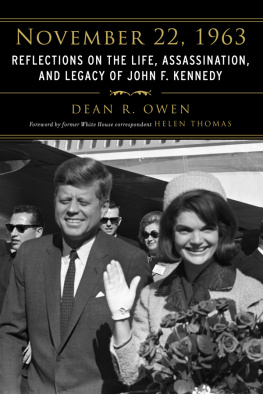
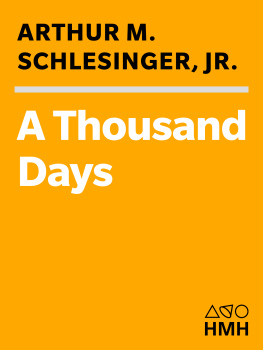
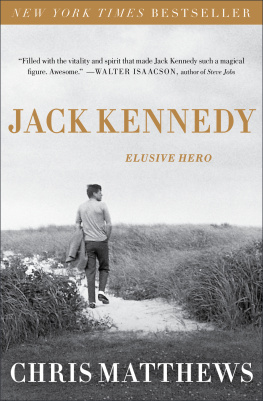
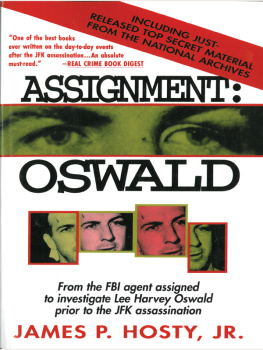
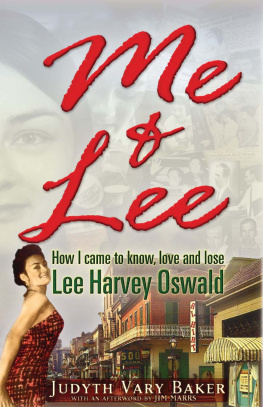
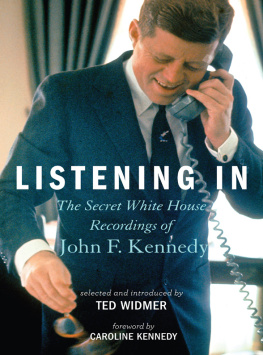
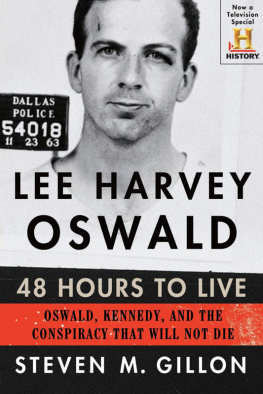
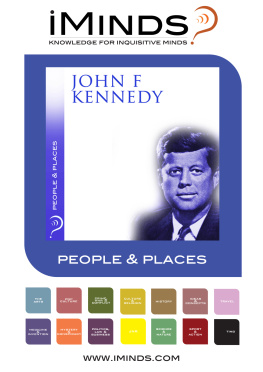

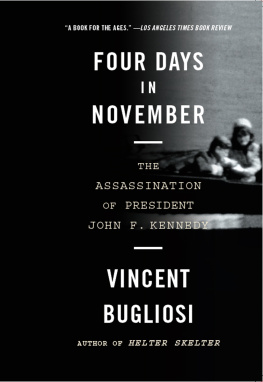
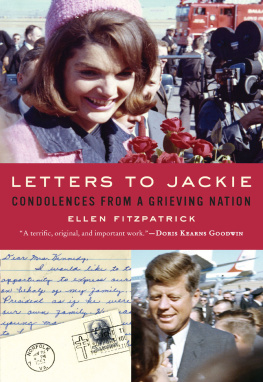
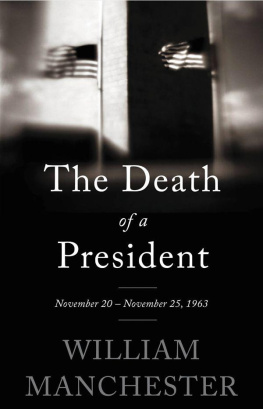
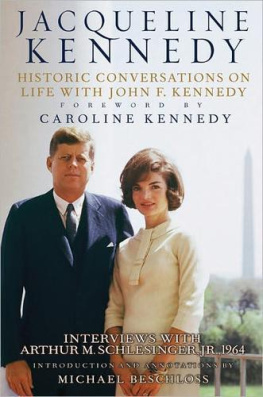
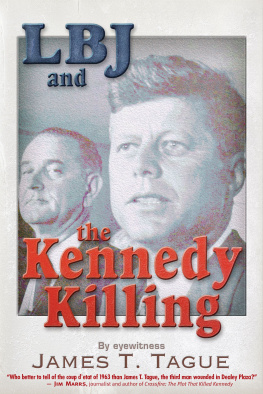
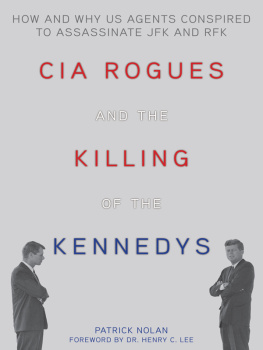


 FOREWORD
FOREWORD